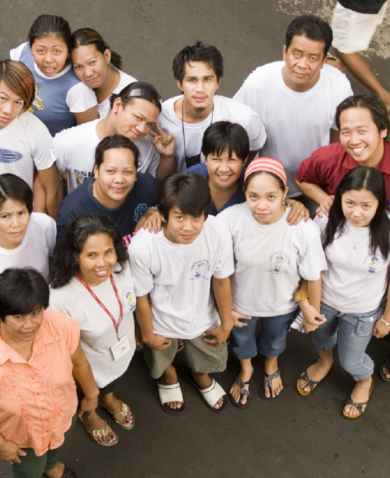
3 Lessons in Empowering Youth Around the World
August 11, 2016 | 3 Minute ReadKatherine Centore shares some best practices for empowering youth based on Chemonics' work in more than 70 countries.
August 12 is International Youth Day, an exciting occasion meant for governments and intuitions to draw attention to youth issues worldwide. More than half the world’s population is now under the age of 30 years old, and it is critical to review successes in working with youth populations to empower young people as tomorrow’s leaders. Below are three strands of success I found in Chemonics work with youth in workforce development, livelihood, and agripreneurship initiatives in 70 countries around the world.
Reaching youth means involving youth
If you want to reach youth, you need to meet them where they are. In Uganda, for example, agriculture contributes approximately 26 percent to gross domestic product and drives food security; however, youth often underestimate agriculture as a viable career beyond subsistence, family-owned farming. USAID’s Uganda Youth Leadership for Agriculture Activity recently held a public event entitled “Agrikool-Youth,” which encouraged young attendees to pursue an agricultural career by highlighting potential career pathways. AgriKool Youth was planned and organized for youth, by youth, through a working committee of young people who determined its theme and messaging, venue, and advertising. The committee decided to advertise using social media, SMS messaging, television, and radio — targeting both in and out of school youth to have the greatest impact. It was seminally due to young people’s involvement that the event drew more than 90 exhibitors and 1,800 youth.
Agripreneurship offers exciting, profitable livelihoods
Agriculture often gets a negative reputation among youth, even in countries with agriculture-based economies. Nigeria, for example, is home to a large youth population and economy based heavily in agriculture. With only half of its 98 million hectares of land currently under cultivation, Nigeria has enormous potential to create more jobs in farming, transportation, mechanization, processing, and business development, which would reduce poverty. Young Nigerians often hold a negative perception of agriculture, however, viewing work in agriculture as less prestigious than careers in information technology to business development. USAID’s Maximizing Agricultural Revenue and Key Enterprises in Targeted Sites (MARKETS) II project promotes agriculture as agribusiness and engages youth in opportunities beyond farming to expand the perception of agricultural work. We have seen the training offered by this program inspire many youth to begin fruitful careers in agriculture. One youth, who can now support her mother and herself as a result, said, “I never thought a three-day training would change my life forever and for the better. I know the importance of saving and keeping records of all my expenses, as they guide all of my business and personal decision making.”
Education (both formal and informal) is key to empowerment
Empowerment starts with education, whether formal or informal. Youth should be encouraged to take charge of their lives by addressing their situation and taking action based on the resources available to them. The USAID Jordan Economic Growth through Sustainable Tourism (EGST) empowered young people to make choices in their employment opportunities by providing vocational education in the hospitality industry and hands-on training to prepare youth for careers in the tourism sector. As a result of their education and vocational training, since 2006 more than 8,500 students have been empowered to begin new careers in tourism. We have seen many lives changed as a result of these investments in education. One female trainee said, “I know I made the right choice to study hospitality. After graduation, I plan to study hotel management while working part time in a hotel, so I will gain a degree and work experience at the same time. Then, I want to attend LaRoche Royal Academy for Culinary Arts as I have always wanted to be a chef.”









































